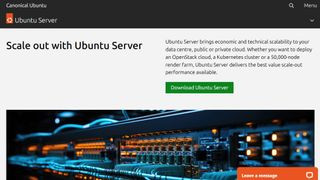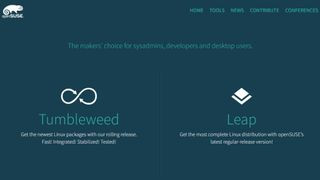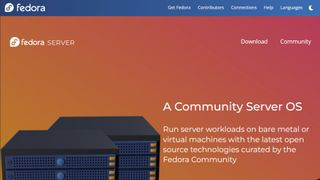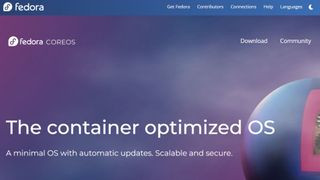Choosing the Best Linux Server Os can be a daunting task, but rental-server.net is here to simplify the process. We offer comprehensive comparisons and guidance to help you select the ideal server solution for your unique needs. Whether you’re focused on dedicated server solutions, virtual private servers (VPS), or cloud hosting, our resources provide the insights necessary to make an informed decision. Explore rental-server.net today to find the perfect hosting environment that ensures optimal performance, reliability, and security for your business.
1. Understanding the Role of Linux in Server Operating Systems
Why is Linux such a popular choice for server operating systems?
Linux is the leading operating system for web servers due to its open-source nature, stability, security, and flexibility. According to W3Techs, Linux powers approximately 70% of web servers. Its widespread use is attributed to its robust performance, cost-effectiveness, and the extensive support available from a large community of developers. Unlike Windows, which is also used for desktop PCs, Linux is specifically designed for server environments, making it ideal for demanding applications and high-traffic websites.
1.1. The LAMP Configuration Explained
What does LAMP stand for and why is it significant?
LAMP stands for Linux, Apache, MySQL, and PHP, a popular open-source web development platform used to host websites and web applications. The combination of these technologies creates a powerful, versatile, and cost-effective solution for deploying and managing web-based services.
- Linux: The operating system provides the foundation for the entire stack.
- Apache: The web server processes HTTP requests and delivers web content to users.
- MySQL: The database management system stores and retrieves data.
- PHP: The scripting language handles dynamic content generation and application logic.
This configuration is significant because it provides a complete and efficient environment for developing and deploying web applications, making it a cornerstone of modern web hosting.
1.2. Linux Distros in Cloud Computing and Virtual Networks
How are Linux distributions used in cloud computing and virtual networks?
Linux distributions are fundamental to cloud computing and virtual networks because they offer the flexibility, scalability, and security required for these environments. Cloud providers like Amazon Web Services (AWS), Microsoft Azure, and Google Cloud Platform (GCP) rely heavily on Linux-based systems to power their infrastructure. According to the Cloud Native Computing Foundation (CNCF), over 90% of cloud applications are containerized, and most containers run on Linux.
Linux distributions enable:
- Virtualization: Creating and managing virtual machines (VMs) efficiently.
- Containerization: Deploying applications in isolated containers using technologies like Docker and Kubernetes.
- Network Management: Configuring and managing virtual networks with tools like Open vSwitch.
- Automation: Automating infrastructure management tasks with tools like Ansible and Terraform.
These capabilities make Linux the preferred choice for building and managing modern, scalable, and resilient cloud environments.
2. Key Factors to Consider When Choosing a Linux Server OS
What factors should I consider when selecting a Linux server OS for my specific needs?
Choosing the right Linux server OS depends on various factors, including scalability, security, stability, and the level of support required. Additionally, consider the ease of installation, availability of a graphical user interface (GUI), and the strength of the online community.
- Scalability: Can the OS handle increasing workloads and traffic?
- Security: Does the OS offer robust security features and regular updates?
- Stability: Is the OS known for its reliability and uptime?
- Support: Is there comprehensive documentation and community or commercial support available?
2.1. Scalability Needs
How do I assess the scalability requirements for my server?
Assessing your server’s scalability requirements involves understanding your current and future resource needs. Start by analyzing your website or application’s traffic patterns, database size, and computational demands. Identify potential growth areas and estimate the resources required to support that growth.
Key considerations include:
- Traffic Volume: How many users will access your server simultaneously?
- Data Storage: How much data will your server need to store and process?
- Application Complexity: How resource-intensive are your applications?
- Growth Projections: How much do you expect your needs to grow in the next year or two?
Based on this analysis, you can choose a Linux server OS that offers the scalability features and performance necessary to meet your demands.
2.2. Security Considerations
What security features should I look for in a Linux server OS?
Security is paramount when choosing a Linux server OS. Look for features such as:
- Regular Security Updates: Timely patches to address vulnerabilities.
- Firewall: A robust firewall to control network traffic.
- Intrusion Detection System (IDS): Tools to detect and prevent malicious activity.
- Access Control: Granular control over user permissions and access rights.
- Security Auditing: Logging and monitoring tools to track security events.
Distributions like Debian and Red Hat Enterprise Linux (RHEL) are known for their strong security features and proactive approach to addressing vulnerabilities. According to a report by the National Institute of Standards and Technology (NIST), RHEL has consistently ranked among the most secure operating systems.
2.3. Stability and Uptime Requirements
How important is stability for a server OS and how can I ensure it?
Stability is crucial for a server OS because it directly impacts uptime and reliability. High uptime ensures that your website or application is consistently available to users, minimizing downtime and potential revenue loss.
To ensure stability:
- Choose a Stable Distribution: Opt for distributions like Debian or CentOS, which are known for their rigorous testing and long-term support.
- Regular Updates: Keep your system updated with the latest security patches and bug fixes.
- Monitoring: Implement robust monitoring tools to detect and address issues proactively.
- Redundancy: Use redundant systems and failover mechanisms to minimize downtime in case of hardware or software failures.
According to the Uptime Institute, downtime can cost businesses thousands of dollars per minute, making stability a critical factor in server OS selection.
2.4. Support and Documentation
What kind of support and documentation should I expect from a Linux server OS?
Comprehensive support and documentation are essential for effectively managing and troubleshooting your Linux server OS. Look for:
- Official Documentation: Detailed guides and manuals covering all aspects of the OS.
- Community Forums: Active online forums where you can ask questions and get help from other users.
- Commercial Support: Paid support options from the distribution vendor or third-party providers.
- Knowledge Base: A searchable database of articles and tutorials addressing common issues.
Distributions like Ubuntu and Red Hat offer extensive documentation and commercial support options, while community-driven distributions like Debian rely heavily on their active user forums.
3. Top Linux Server Distributions in 2025
What are the top Linux server distributions available in 2025?
Several Linux server distributions stand out for their performance, stability, and features. These include Ubuntu Server, Debian, OpenSUSE, Fedora Server, and CoreOS. Each distribution caters to different needs and priorities, making it essential to choose the one that best aligns with your specific requirements.
3.1. Ubuntu Server
Why is Ubuntu Server a popular choice for scalability?
Ubuntu Server is a popular choice for scalability because it offers long-term support (LTS), integrates WireGuard VPN, and provides options for paid enterprise support. Canonical, the company behind Ubuntu, releases LTS versions that receive updates for up to five years, reducing the frequency of upgrades. According to Canonical, over 55% of OpenStack clouds run on Ubuntu, highlighting its suitability for cloud infrastructure.
- Long Term Support (LTS): Ensures stability and reduces maintenance overhead.
- WireGuard VPN: Enhances security and network performance.
- Ubuntu Cloud Server: Facilitates the deployment of cloud platforms.
- Managed OpenStack Cloud: Offers professional setup and management services.
 Ubuntu Website Screenshot
Ubuntu Website Screenshot
3.2. Debian
What makes Debian an excellent choice for stability?
Debian is renowned for its stability, making it an excellent choice for server environments where reliability is paramount. With over 20 years of development, Debian prioritizes stability by rigorously testing packages before including them in the stable release. This ensures a reliable system, though it may lag behind in incorporating the latest software.
- Emphasis on Stability: Packages undergo extensive testing before release.
- Long-Established: A proven track record of reliability.
- Exceptional Security: Focus on security best practices.
- Multi-Architectural Support: Available for various hardware platforms.
3.3. OpenSUSE
Why is OpenSUSE considered one of the most underrated server distros?
OpenSUSE is often considered underrated due to its multiple release models (Leap and Tumbleweed), atomic updates, and comprehensive documentation. OpenSUSE Leap offers a stable platform preferred by many users, while Tumbleweed provides a rolling release version for those who want the latest software. The YaST Control Center and Zypper package manager simplify administration and management.
- Multiple Release Models: Offers both stable and rolling release options.
- Atomic Updates: Ensures consistent and reliable updates.
- YaST Control Center: Simplifies system administration.
- Well-Documented: Extensive documentation and support resources.
 OpenSUSE Website Screenshot
OpenSUSE Website Screenshot
3.4. Fedora Server
What benefits does Fedora Server offer for cloud environments?
Fedora Server is ideal for fast-moving tech adoption and cloud deployments. It includes FreeIPA for managing authentication credentials and offers modular packages that allow consistent environments across different versions. Fedora Server provides installation images for various cloud environments, including OpenStack, Vagrant, and Amazon Public Cloud.
- Fast-Moving Tech Adoption: Incorporates the latest technologies and updates.
- FreeIPA: Centralized management of authentication credentials.
- Modular Packages: Consistent environments across different versions.
- Cloud Images: Optimized for various cloud environments.
 Fedora Website Screenshot
Fedora Website Screenshot
3.5. CoreOS
Why is CoreOS the best Linux server distro for containers?
CoreOS, now Fedora CoreOS, is specifically designed for running containerized workloads securely and at scale. It features automatic updates, supports multiple cloud platforms, and comes with Docker and Podman pre-installed. CoreOS is available in three release streams: Stable, Testing, and Next, providing images for bare metal and virtualized environments.
- Container-Optimized: Designed specifically for container deployments.
- Auto-Updates: Ensures the system is always up-to-date.
- Multiple Cloud Platforms: Supports Amazon Web Services (AWS), Google Cloud Platform (GCP), Azure, and more.
- Docker and Podman: Comes with container runtimes pre-installed.
 CoreOS Website Screenshot
CoreOS Website Screenshot
4. Additional Linux Server Distributions to Consider
Are there other Linux distributions that are worth considering for server use?
Yes, several other Linux distributions are worth considering for server use, depending on your specific needs and circumstances. These include Red Hat Enterprise Linux (RHEL), FreeBSD, and CloudLinux.
4.1. Red Hat Enterprise Linux (RHEL)
What makes Red Hat Enterprise Linux (RHEL) a good choice for commercial deployments?
Red Hat Enterprise Linux (RHEL) is designed for commercial deployment in enterprise environments, offering stability, reliability, and guaranteed support. While it requires a proprietary license, many businesses view this as an assurance of quality and support. According to a study by IDC, RHEL is used by over 90% of Fortune 500 companies, highlighting its prevalence in the enterprise sector.
- Commercial Focus: Designed for enterprise environments.
- Guaranteed Support: Comprehensive support and maintenance services.
- Stability and Reliability: Rigorous testing and long-term support.
- Extensive Ecosystem: Large community and partner network.
4.2. FreeBSD
Why is FreeBSD known for its security and stability?
FreeBSD, while technically a Unix-powered operating system rather than Linux, is known for its security and stability. It comes as a complete set, reducing reliance on third-party software and enhancing security. FreeBSD is often offered by hosting companies as a server option alongside Linux distributions.
- Unix-Based: Inherits the stability and security of Unix.
- Complete Set: Comes with all necessary components.
- Security Focus: Known for its robust security features.
- Stability: Reliable and consistent performance.
4.3. CloudLinux
How does CloudLinux enhance shared hosting environments?
CloudLinux is specifically built for virtualized cloud operations to power shared hosting services. It allocates and limits server resources to each tenant, creating a more secure and stable environment. Each tenant is partitioned from each other, enhancing security and preventing resource abuse. The result is a hosting platform that has built-in redundancy, stability, and security.
- Virtualized Environment: Designed for cloud and shared hosting.
- Resource Allocation: Limits resources per tenant for stability.
- Security: Partitions tenants to prevent cross-contamination.
- Redundancy: Built-in redundancy for high availability.
5. Comparing Linux Server OS Options
How can I compare the different Linux server OS options to make the best choice?
To make the best choice, compare the different Linux server OS options based on your specific requirements for scalability, security, stability, support, and ease of use. Consider the factors discussed earlier, such as traffic volume, data storage needs, and application complexity.
5.1. Scalability Comparison
Which Linux server OS offers the best scalability?
Ubuntu Server and Fedora Server are often considered the best for scalability due to their support for cloud environments and containerization technologies. Ubuntu Server’s LTS and Cloud Server options make it suitable for growing infrastructures, while Fedora Server’s fast-moving tech adoption and modular packages provide flexibility.
| Feature | Ubuntu Server | Fedora Server |
|---|---|---|
| LTS | Yes (5 years) | No |
| Cloud Support | Ubuntu Cloud Server, Managed OpenStack | OpenStack, Vagrant, Amazon Public Cloud |
| Containerization | Docker, Kubernetes | Docker, Podman |
| Ideal Use Case | General-purpose servers, cloud infrastructure | Fast-paced development, cloud environments |
5.2. Security Comparison
Which Linux server OS provides the best security features?
Debian and Red Hat Enterprise Linux (RHEL) are renowned for their security features. Debian’s emphasis on stability and rigorous testing minimizes vulnerabilities, while RHEL’s commercial focus ensures timely security updates and comprehensive support.
| Feature | Debian | Red Hat Enterprise Linux (RHEL) |
|---|---|---|
| Stability | High | High |
| Update Frequency | Less frequent (focus on stability) | Frequent (commercial support) |
| Security Auditing | Strong community support | Comprehensive commercial support |
| Ideal Use Case | Security-critical applications, stable servers | Enterprise environments, commercial apps |
5.3. Stability Comparison
Which Linux server OS is the most stable?
Debian is widely regarded as the most stable Linux server OS due to its rigorous testing process and long-term support. OpenSUSE Leap also offers excellent stability with its well-documented and thoroughly tested packages.
| Feature | Debian | OpenSUSE Leap |
|---|---|---|
| Testing Process | Rigorous, extensive | Thorough, well-documented |
| Update Approach | Conservative, stability-focused | Balanced, reliable updates |
| Use Cases | Production servers, critical applications | General-purpose servers, stable environments |
5.4. Support Comparison
Which Linux server OS offers the best support options?
Red Hat Enterprise Linux (RHEL) and Ubuntu Server offer the best support options, with comprehensive commercial support and extensive documentation. OpenSUSE also provides excellent community support and well-documented resources.
| Feature | Red Hat Enterprise Linux (RHEL) | Ubuntu Server | OpenSUSE |
|---|---|---|---|
| Commercial Support | Yes | Yes | No |
| Documentation | Extensive | Extensive | Well-documented |
| Community Support | Strong | Strong | Active community |
| Ideal For | Enterprise, commercial apps | General-purpose, cloud | Varied, community-focused |
6. Step-by-Step Guide to Choosing the Right Linux Server OS
How can I systematically choose the right Linux server OS for my needs?
Choosing the right Linux server OS involves a systematic approach to assess your requirements, evaluate available options, and make an informed decision.
6.1. Define Your Server Needs
What are the key questions to ask when defining my server needs?
Start by defining your server needs by answering the following questions:
- What is the primary purpose of the server? (Web hosting, application hosting, database server, etc.)
- What are the expected traffic levels? (Low, medium, high)
- What are the storage requirements? (Small, medium, large)
- What are the performance requirements? (Low, medium, high)
- What is your budget? (Low, medium, high)
- Do you require commercial support? (Yes/No)
- What is your level of Linux expertise? (Beginner, intermediate, advanced)
6.2. Evaluate Linux Distributions
How do I evaluate different Linux distributions based on my needs?
Evaluate different Linux distributions based on the factors discussed earlier, such as scalability, security, stability, and support. Use the comparison tables provided to narrow down your options.
6.3. Test and Deploy
What are the best practices for testing and deploying a Linux server OS?
Before deploying your chosen Linux server OS in a production environment, it’s essential to test it thoroughly. Best practices include:
- Virtualization: Use virtualization software like VMware or VirtualBox to test the OS in a sandboxed environment.
- Benchmarking: Run performance benchmarks to evaluate the OS’s ability to handle your expected workloads.
- Security Audits: Perform security audits to identify and address potential vulnerabilities.
- Pilot Deployment: Deploy the OS in a pilot environment with a small subset of users before rolling it out to the entire organization.
6.4. Monitor and Maintain
What tools and practices should I use to monitor and maintain my Linux server OS?
Once your Linux server OS is deployed, it’s crucial to monitor and maintain it to ensure optimal performance and security. Key practices include:
- Monitoring Tools: Use monitoring tools like Nagios, Zabbix, or Prometheus to track system performance and identify potential issues.
- Regular Updates: Keep your system updated with the latest security patches and bug fixes.
- Backup and Recovery: Implement a robust backup and recovery strategy to protect against data loss.
- Security Hardening: Harden your system by disabling unnecessary services, configuring firewalls, and implementing intrusion detection systems.
7. The Future of Linux Server Operating Systems
What are the emerging trends and technologies in Linux server operating systems?
The future of Linux server operating systems is shaped by emerging trends and technologies such as containerization, cloud computing, and automation.
7.1. Containerization and Orchestration
How are containerization and orchestration changing the landscape of server OS?
Containerization and orchestration technologies like Docker and Kubernetes are revolutionizing the way applications are deployed and managed. These technologies enable developers to package applications and their dependencies into containers, which can be easily deployed and scaled across different environments.
According to a report by Gartner, by 2025, over 85% of global organizations will be running containerized applications in production, highlighting the growing importance of containerization in the enterprise.
7.2. Cloud-Native Technologies
What are cloud-native technologies and how do they impact server OS choices?
Cloud-native technologies are designed to take full advantage of cloud computing environments. These technologies include microservices, serverless computing, and container orchestration. Cloud-native applications are typically deployed in containers and managed using orchestration platforms like Kubernetes.
Choosing a Linux server OS that is optimized for cloud-native technologies is essential for organizations looking to build and deploy scalable, resilient, and efficient cloud applications.
7.3. Automation and Infrastructure as Code
How does automation and infrastructure as code simplify server management?
Automation and infrastructure as code (IaC) are transforming the way servers are managed. IaC enables organizations to define and manage their infrastructure using code, which can be version-controlled, tested, and automated.
Tools like Ansible, Terraform, and Chef enable organizations to automate infrastructure provisioning, configuration, and deployment, reducing manual effort and improving consistency. According to a survey by Puppet, organizations that adopt IaC experience a 50% reduction in deployment times and a 40% reduction in errors.
8. Frequently Asked Questions (FAQ) About Best Linux Server OS
Here are some frequently asked questions about choosing the best Linux server OS:
8.1. What is the best Linux server OS for beginners?
Ubuntu Server is often recommended for beginners due to its user-friendly interface, extensive documentation, and large community support.
8.2. Which Linux server OS is the most secure?
Debian and Red Hat Enterprise Linux (RHEL) are known for their strong security features and are often considered the most secure.
8.3. What is the difference between Ubuntu Server and Debian?
Ubuntu Server is based on Debian but offers a more frequent release cycle and commercial support options. Debian focuses on stability and is entirely community-driven.
8.4. Is a GUI necessary for a Linux server OS?
A GUI is not necessary for a Linux server OS, as most server tasks can be performed via the command line. However, some users may prefer a GUI for ease of use.
8.5. How often should I update my Linux server OS?
You should update your Linux server OS regularly to ensure you have the latest security patches and bug fixes.
8.6. What is the best way to monitor my Linux server OS?
Use monitoring tools like Nagios, Zabbix, or Prometheus to track system performance and identify potential issues.
8.7. Can I run Windows applications on a Linux server OS?
You can run some Windows applications on a Linux server OS using compatibility layers like Wine or virtualization technologies like VMware.
8.8. What is the role of a kernel in a Linux server OS?
The kernel is the core of the Linux operating system, responsible for managing system resources and providing an interface between hardware and software.
8.9. How do I choose between a dedicated server and a VPS?
Choose a dedicated server if you require maximum performance and control, and a VPS if you need a more cost-effective solution with flexible scalability.
8.10. What are the benefits of using a Linux server OS for web hosting?
The benefits of using a Linux server OS for web hosting include stability, security, cost-effectiveness, and extensive support for web technologies like Apache, MySQL, and PHP.
9. Conclusion: Making the Right Choice for Your Server Needs
Selecting the best Linux server OS for your specific needs is a critical decision that can significantly impact your organization’s performance, security, and reliability. By carefully considering factors such as scalability, security, stability, and support, and by evaluating the top Linux distributions available in 2025, you can make an informed choice that aligns with your requirements.
Remember, rental-server.net is here to help you navigate the complexities of server selection. Explore our comprehensive resources, compare options, and find the perfect hosting environment to meet your business needs.
Ready to find the best Linux server OS for your business? Visit rental-server.net today to explore our wide range of server solutions and get expert advice. Contact us at +1 (703) 435-2000 or visit our office at 21710 Ashbrook Place, Suite 100, Ashburn, VA 20147, United States. Let rental-server.net help you achieve optimal performance, reliability, and security for your server infrastructure.

